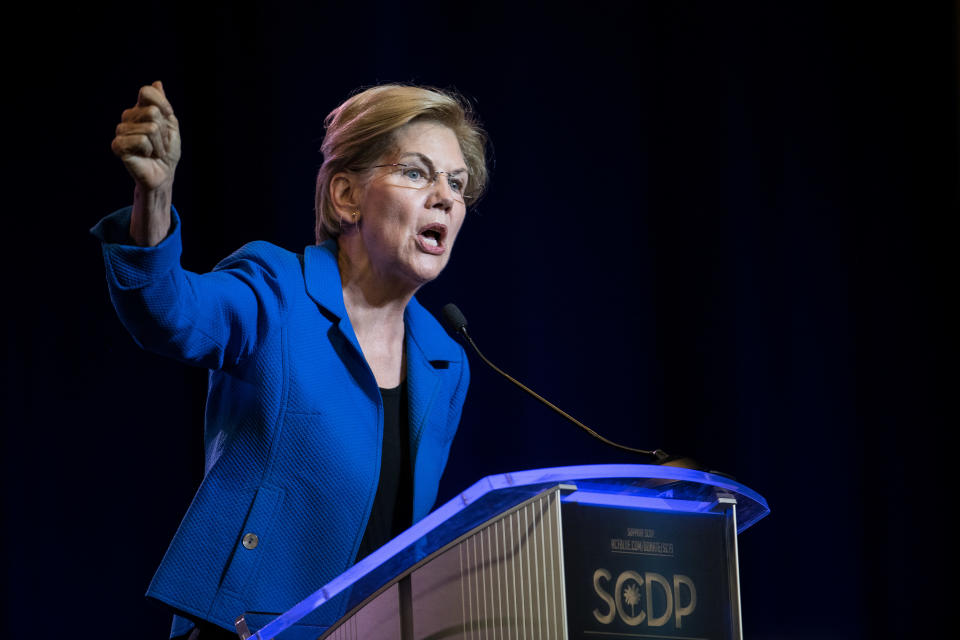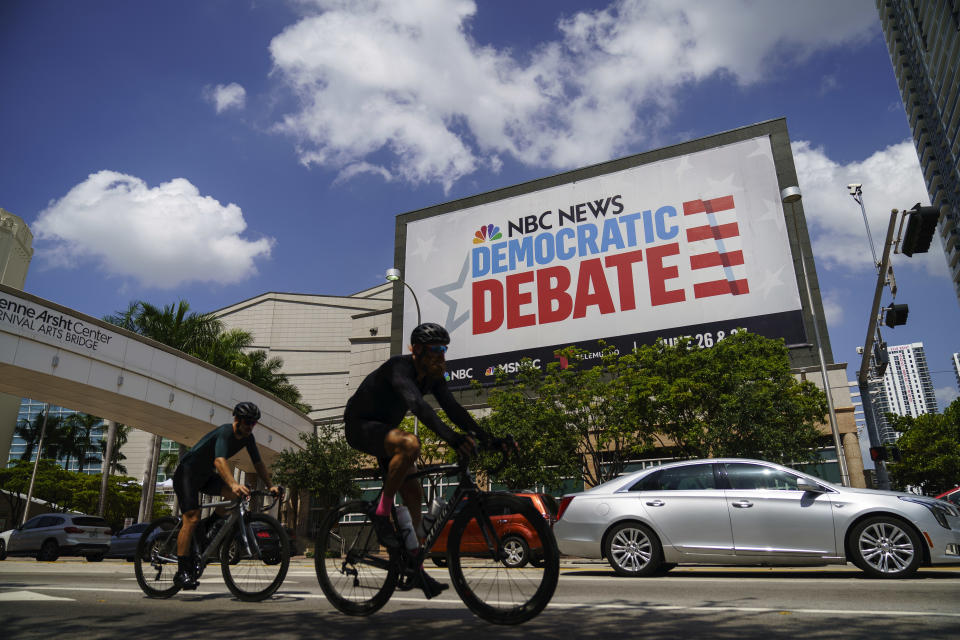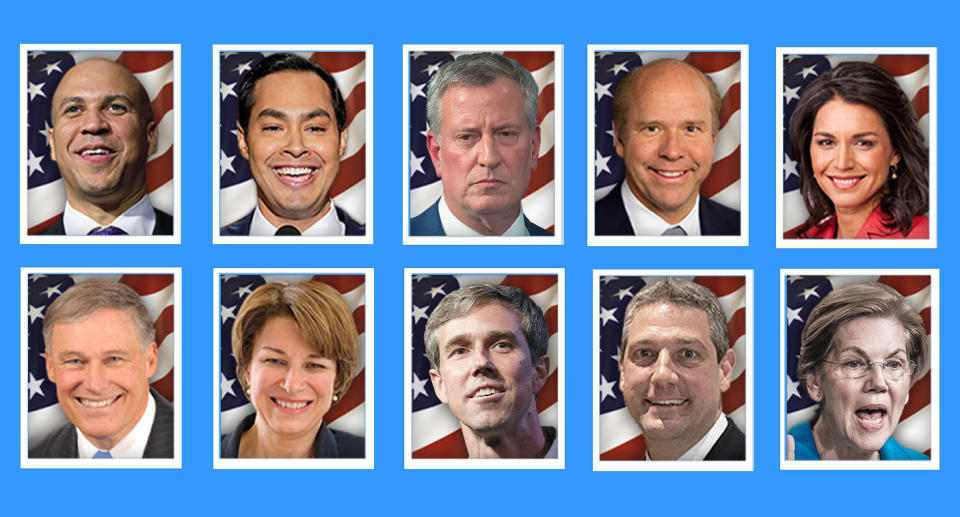There's no debate about it: All eyes on Warren as Dems take the stage
- Oops!Something went wrong.Please try again later.
Wednesday night will mark the first time a large number of Democratic presidential hopefuls will stand on the same stage at the same time and answer the same questions from the same questioners.
Just don’t call it a debate.
Whatever presidential debates used to be — or will be again, when the field eventually narrows to a handful of competitors, then just a couple — the meeting in Miami won’t be that. Not only is it logistically impossible to engage in a vigorous war of words with your opponents when there are nine of them surrounding you on stage. Tonight, it doesn’t even make strategic sense.
Despite the Democratic National Committee’s best efforts to spread varsity and junior varsity contenders evenly across two evenings, a randomized drawing has resulted in a Thursday “debate” featuring candidates whose combined polling support tops 60 percent — and a Wednesday “debate” featuring candidates whose combined polling support hovers in the low-to-mid 20s. The only first-tier candidate among them, Massachusetts Sen. Elizabeth Warren, accounts for fully half of that support; the rest have either struggled to clear 2 percent in the polls (former Texas Rep. Beto O’Rourke, Minnesota Sen. Amy Klobuchar, New Jersey Sen. Cory Booker) or lingered just above the 1 percent threshold for qualification (former San Antonio Mayor Julian Castro, Ohio Rep. Tim Ryan, Hawaii Rep. Tulsi Gabbard, Washington Gov. Jay Inslee, New York Mayor Bill De Blasio, former Maryland Rep. John Delaney).

With a lower-wattage lineup like that, there’s no real incentive for anyone to fight anyone else. Warren’s true rivals are gathering tomorrow; everyone else’s true rival, for now, is him- or herself.
So if not a debate, per se, what will Miami be?
Put simply, a platform. The allusion to social media is deliberate. Sure, viewership will be relatively high. But the proceedings will be scattershot and confusing — 10 candidates, few of them well known, spouting soundbites in quick succession and speaking for a grand total of maybe five minutes each. Meanwhile, the vast majority of tonight’s intended audience, the Democratic primary electorate, will be absorbing the event through the reductive filter of tomorrow’s Facebook feed.
All of which puts a premium on a very specific kind of performance: The Clickable Moment.
As New York Times television critic James Poniewozik astutely observed of the overcrowded primary as a whole, “the umpteen Democratic candidates have two challenges. One is to figure out what entices news producers to show their clips and what lures voters scrolling their phones to hit play. The second, related to the first, is to implicitly argue how they, in a general election, would seize attention from a president who can re-scramble the day’s news lineup by tweeting a mean nickname before breakfast.”
The goal, in other words, is to go viral. But in Miami, the stakes won’t be the same for everyone. Here are three story lines to watch:

Will Warren come out fighting — or play it safe?
As tonight’s undeniable big dog, Warren will likely attract the most interest from viewers and pundits. Her position is perhaps the most complicated of the bunch. Long considered a potential 2020 frontrunner, she stumbled right out of the gate by responding to President Trump’s “Pocahontas” taunts with a slick video touting her distant Native American ancestry, and her campaign stalled for months. Yet in recent weeks Warren has received reams of positive coverage for her extensive policy proposals, and polling both nationally and in key early states has shown her climbing into third place behind Joe Biden and Bernie Sanders.
The question tonight is whether Warren will seek to maintain her momentum by continuing to emphasize policy and hewing closely to her well-honed talking points about reforming government to “work for you” and not just “the wealthy and well-connected” — or whether she will step on the gas by drawing contrasts with Biden and Sanders, even in their absence.
The former approach would be more voter-centric: an opportunity for Warren to simply deliver her message to a huge audience of Democrats who have yet to see her stump. The latter would more media-friendly: a way to undercut her main rival on the left (Sanders) and in the middle (Biden) while staying in the news as the spotlight immediately shifts to Thursday’s event. Given Warren’s recent rise, however, she will be subject to more intense scrutiny than her lower-polling rivals. And that’s an argument to play it safe; any missteps will likely go viral in precisely the wrong way, as her DNA test did.
Can O’Rourke, Klobuchar or Booker break out?
On paper, all three of them are plausible Democratic nominees. The Texas phenomenon who came out of nowhere to nearly unseat Republican super-villain Ted Cruz. The Minnesota everywoman who knows how to win in Trump country. And the eloquent, inspiring black senator with the sterling résumé and deep commitment to inner-city America.
Yet neither Booker nor Klobuchar has ever cleared 7 percent in the polling averages; today, they average 2.4 percent and 1 percent respectively. And while O’Rourke got off to a strong start, his numbers have declined steadily ever since, settling just above 3 percent

Tonight’s gathering in Miami is their best chance yet to shake things up. And though each of them has released substantial policy proposals in recent weeks — O’Rourke on climate change and immigration; Booker on housing and baby bonds; Klobuchar on the 100-plus executive actions she’d take during her first 100 days — any fireworks tonight will likely center on emotion. Watch for Booker to deploy his considerable rhetorical skills to address his dispute with Biden over the latter invoking his ability, as a young senator, to work with racist colleagues from the South. Watch for O’Rourke to generate the kind of earnest, uplifting moment that served him so well in the 2018 Texas Senate race (as when he defended NFL quarterback Colin Kaepernick for kneeling during the national anthem). And watch for Klobuchar — perhaps the only genuinely funny candidate in the entire field — to use humor to her advantage.
Whether any of it will be enough to turn things around for Booker, O’Rourke or Klobuchar, who knows? But they can’t win on their current trajectories, so some sort of shakeup is in order.
Can the others stay in the race?
The DNC’s standards for inclusion in the first round of debates were fairly broad: Amass at least 65,000 individual donors, including at least 200 in each of 20 states, or 1 percent support in three national or early primary-state polls. Which is why 20 candidates qualified.
But the bar is being raised significantly for the second round of debates this fall: candidates will need at least 130,000 donors, including a minimum of 400 each in 20 states, and at least 2 percent support in four national or early primary-state polls.
That means Castro, Ryan, Gabbard, Inslee, de Blasio and Delaney — none of whom are averaging more than 1 percent in national polls — will have to get noticed somehow if they hope to survive.
How exactly they do that is a puzzle each individual candidate will have to solve. (De Blasio in particular has tried on several occasions, with dismal results. But while the road ahead is daunting, it’s not impossible.
As FiveThirtyEight’s Julia Azari recently pointed out, studies have shown that “debates have the most impact when voters have relatively little information about the candidates and it’s still early in the election cycle” — and “that they’re also most useful when the field is crowded” because “they can help lesser-known candidates appear electable.”
In other words, if you’re barely registering in the polls, the time to make your move is now.

Read more from Yahoo News:



